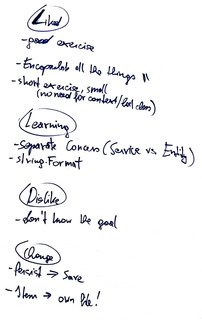Kata Factory
One session, run by Bastien David, a software crafter from Grenoble, was named Kata Factory. Bastien guided us to create a short exercise with a very small code base, focused on a single topic. In the first part of the session we created small tasks working in pairs. Then we solved a task from another pair in the second part. A total of four new coding exercises was created, tried and refined. It was awesome.
Promotion Service Kata
I worked with Dmitry Kandalov and we created the Promotion Service Kata. It is a small refactoring exercise, based on Feature Envy, a code smell listed in Martin Fowler's book. (Did you know that there is a second edition of this great book? No, so get it quickly.) The code base contains a single service, the promotion service, which calculates discounts for promoted items. It is a bit crazy because it also reduces the tax. The data is stored in a classic DTO and its fields are not encapsulated. The task is to make it a rich object and encapsulate its fields. There are existing unit tests to make sure things are still working.
After the Kata Factory, I spent some time on porting the kata to different languages. Currently the code is available in C#, Java, Kotlin, PHP and Python. Pull requests porting the code to other languages are very welcome. Check out the code here.
 Notes from first run
Notes from first runI already facilitated the exercise with a small team of C# developers. Here is what they said about the kata:
- It is a good exercise.
- It is a short exercise. It is small, so there is no need for context.
- Encapsulate all the things!
- I learned to separate concerns.
- I learned about
string.Format(a C# specific function). - I did not know the goal of the exercise.
- Maybe rename the
Persist()method toSave(). - The
Itemclass should be in its own file.
Bastien's approach shows that it is possible to create a brand new and highly focused coding exercise in a short time. As with most development related things, pair work is superior and it is easy to come up with new code katas when working in pairs. Small exercises - I call them micro exercises - are easy to get started because there is little context to know. Context is part of what makes coding assignments difficult. I am very happy with this new exercise.
Give it a try!








No comments:
Post a Comment